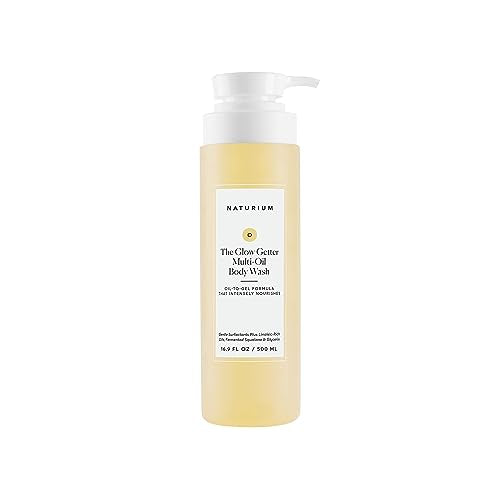
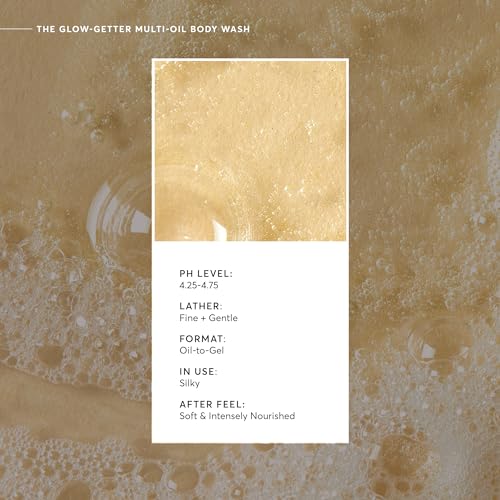
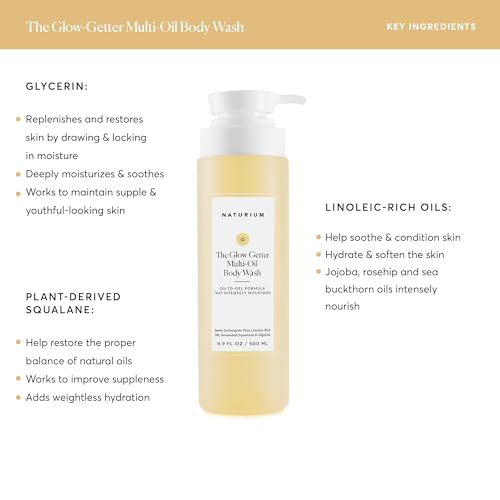
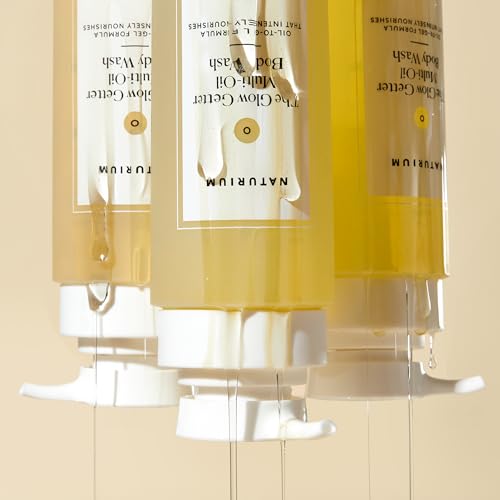
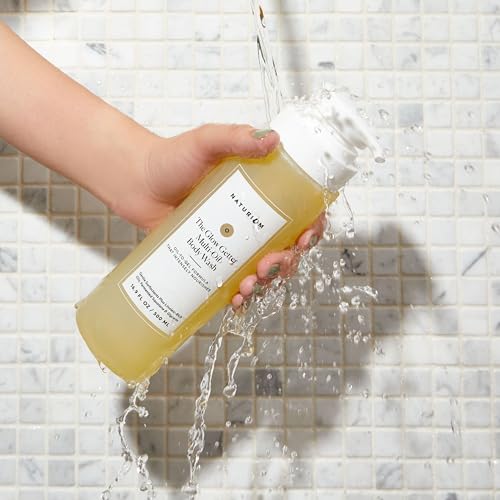
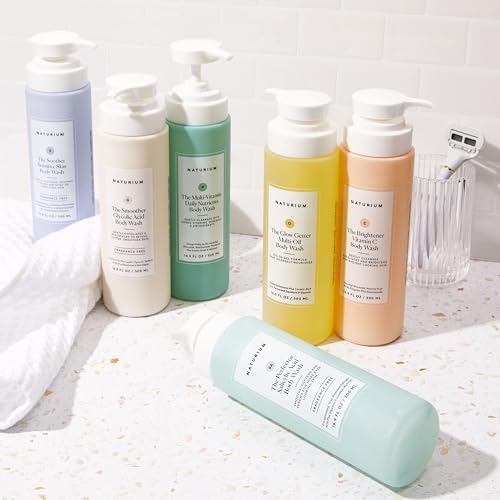
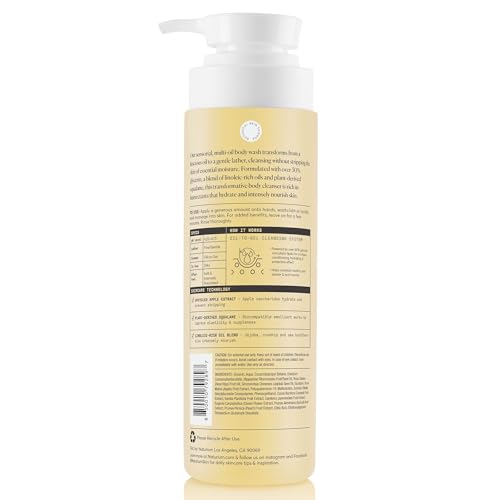
Naturium Body Wash - Hydrating Gentle Cleanser, pH Balanced, Vegan - 16.9 oz


Eugenia Caryophyllus (Clove) Flower Extract
High RiskEugenia caryophyllus (clove) flower extract is derived from the flower buds of the clove tree, primarily used for its aromatic properties and as a natural preservative in various products. It contains bioactive compounds that may contribute to its functional benefits.
Sustai Insights
Eugenia caryophyllus (clove) flower extract offers functional benefits such as antimicrobial properties and is known for its use in aromatherapy. However, it has a high allergenic potential and may cause irritation in sensitive individuals. While it is not associated with significant carcinogenic or reproductive toxicity risks, regulatory bodies have placed some restrictions on its use. Overall, the ingredient presents a high risk level due to its potential health impacts. Safe usage practices should be observed, and alternatives like essential oils with lower allergenic potential may be considered.
Cocamidopropyl Betaine
High RiskCocamidopropyl betaine is a synthetic surfactant derived from coconut oil, commonly used in personal care products for its mild cleansing and foaming properties. It functions as a surfactant, emulsifier, and thickening agent, contributing to the texture and performance of formulations.
Sustai Insights
Cocamidopropyl betaine offers functional benefits as a gentle surfactant, enhancing product foaming and texture. However, it may pose low to moderate allergenic risks and is subject to high use restrictions due to contamination concerns. Regulatory bodies have advised on its safe levels of usage, categorizing its risk level as high overall. Users should practice caution, particularly with sensitive populations, and consider alternatives like naturally derived surfactants for safer formulations.
Glycerin
Medium RiskGlycerin (also called glycerol) is a naturally occurring compound commonly used in personal care and cosmetic products. It functions as a humectant, attracting moisture to the skin, and is also utilized as a solvent and emollient to enhance product texture and stability.
Sustai Insights
Glycerin is valued for its effective moisturizing properties and biodegradability, making it a widely accepted ingredient in formulations. It poses low health risks, including low concerns for carcinogenicity and allergies. However, moderate use restrictions exist due to regulatory guidelines. While glycerin does not significantly contribute to environmental pollution, its production process should be ethically sourced. Overall, glycerin holds a medium risk level, emphasizing the importance of safe usage practices and considering sustainable alternatives.
Citric Acid
Medium RiskCitric acid is an alpha hydroxy acid used in personal care products primarily for its role as a pH adjuster and natural preservative. It occurs naturally in citrus fruits and is commonly utilized in various formulations for its chelating properties and mild exfoliation benefits.
Sustai Insights
Citric acid offers functional benefits as an effective preservative and pH stabilizer, contributing to product longevity and stability. It is biodegradable and derived from renewable sources. Health risks are low, with minimal concerns regarding carcinogenicity, allergies, and reproductive toxicity. However, moderate use restrictions exist due to potential irritation at high concentrations. Environmental risks are limited, as citric acid is not known to accumulate in ecosystems. Regulatory agencies have no significant advisories against its use. Overall, it is assessed as a medium-risk ingredient, with safe usage practices recommended and alternatives available.
Phenoxyethanol
Medium RiskPhenoxyethanol is a preservative used in cosmetics and personal care products to prevent microbial growth and extend shelf life. It is commonly found in formulations such as lotions, creams, and serums.
Sustai Insights
Phenoxyethanol serves effectively as a preservative, ensuring product stability and safety by inhibiting microbial growth. It is considered to have low health risks regarding carcinogenicity, allergies, and reproductive toxicity. However, moderate use restrictions exist, and regulatory bodies have advised caution in specific applications. Environmental concerns include its potential as a pollutant, although it is not highly bioaccumulative. Overall, the ingredient presents a medium risk level, with safe usage practices recommended and alternative preservatives available for those seeking greener options.
Prunus Armeniaca (Apricot) Fruit Extract
Low RiskPrunus armeniaca (apricot) fruit extract is derived from the fruit of the apricot tree. It is commonly used in cosmetic and skincare products for its moisturizing properties and potential antioxidant benefits. The extract is known for contributing to skin hydration and overall skin appearance.
Sustai Insights
Prunus armeniaca (apricot) fruit extract offers functional benefits such as moisturizing and antioxidant properties, contributing to skin hydration. It is considered environmentally friendly with a low risk of pollution or bioaccumulation. Health risks associated with this ingredient are minimal, with low concerns for carcinogenicity, allergens, and reproductive toxicity. Regulatory assessments indicate no current restrictions. Overall, the ingredient is assessed as low risk, making it a safe choice for use in cosmetic formulations.
Maltodextrin
Low RiskMaltodextrin is a saccharide material obtained from starch through partial hydrolysis. It is commonly used as a thickener, filler, or preservative in food and cosmetic products due to its ability to enhance texture and stability.
Sustai Insights
Maltodextrin serves as an effective thickener and stabilizer in various products, and it is typically derived from renewable sources. Health risks are minimal, as it poses low concerns for carcinogenicity, allergies, and developmental toxicity. Environmental impacts are also low, with no significant pollutant or bioaccumulation potential. Regulatory bodies do not impose major restrictions on its use. Overall, maltodextrin presents a low-risk profile, making it a widely accepted ingredient in food and cosmetic formulations.
Tetrasodium Glutamate Diacetate
Low RiskTetrasodium glutamate diacetate is a sodium salt of glutamic acid, primarily functioning as a chelating agent in various cosmetic and personal care products. It helps stabilize formulations by binding metal ions, thereby enhancing product efficacy and shelf life.
Sustai Insights
Tetrasodium glutamate diacetate is recognized for its functional benefits in stabilizing formulations and preventing metal ion interference. It poses low health risks, with minimal concerns regarding carcinogenicity, allergies, or reproductive toxicity. Environmental impacts are also low, with no significant pollutant or bioaccumulation concerns noted. Regulatory bodies do not impose severe restrictions on its use. Overall, it is considered a low-risk ingredient. Safe usage practices should be followed, and alternatives such as other chelating agents may be explored for specific formulations.
Sorbitan Oleate Decylglucoside Crosspolymer
Low RiskSorbitan oleate decylglucoside crosspolymer is a synthetic polymer derived from sorbitan oleate and decylglucoside. It functions primarily as an emulsifier and thickening agent in cosmetic and personal care products, aiding in the stabilization of formulations and improving texture.
Sustai Insights
Sorbitan oleate decylglucoside crosspolymer offers functional benefits as an effective emulsifier and stabilizer, enhancing product consistency. It has low health risk concerns related to carcinogenicity, allergenic potential, and reproductive toxicity. Environmentally, it presents low bioaccumulation and pollution risks. Regulatory bodies do not impose restrictions on its use. Overall, its risk level is assessed as low, making it a suitable ingredient in formulations.
Polyquaternium 10
Low RiskPolyquaternium-10 is a synthetic polymer used primarily as a conditioning agent in cosmetic products. It enhances the texture and feel of hair and skin, providing moisture retention and improved manageability. This ingredient is known for its film-forming properties, which can help reduce frizz and static.
Sustai Insights
Polyquaternium-10 offers functional benefits in enhancing moisture retention and improving product texture. It is considered to have low health risks, with minimal concerns regarding carcinogenicity, allergenic potential, and neurotoxicity. Environmentally, it poses low ecotoxicity and is not known to bioaccumulate. Regulatory assessments indicate no significant restrictions, categorizing it as low risk overall. For safe use, it is recommended to follow product guidelines. Alternatives include natural conditioning agents like guar gum or xanthan gum for those seeking plant-based options.
Cocos Nucifera Fruit Extract
Low RiskCocos Nucifera Fruit Extract is an extract derived from the fruit of the coconut palm, commonly used in cosmetic formulations for its moisturizing properties. It serves primarily as a skin conditioning agent, contributing to product texture and hydration.
Sustai Insights
Cocos Nucifera Fruit Extract offers functional benefits such as effective skin hydration and conditioning, with sustainable sourcing potential. Scientific assessments indicate low health risks, including minimal concerns for carcinogenicity, allergies, and reproductive toxicity. Environmental impacts are also low, with no significant bioaccumulation or pollution concerns. Regulatory bodies do not impose restrictions on its use, leading to an overall low-risk classification. Safe usage practices include patch testing for sensitive individuals. Alternatives like shea butter or other plant-based extracts may be considered for similar benefits.
Pyrus Malus (Apple) Fruit Extract
Low RiskPyrus malus (apple) fruit extract is derived from the fruit of the apple tree and is commonly used in cosmetic formulations for its nourishing properties and potential skin benefits.
Sustai Insights
Pyrus malus (apple) fruit extract offers functional benefits such as antioxidant properties and skin conditioning. It is considered low risk for health concerns, including cancer, allergies, and reproductive toxicity. Environmentally, it poses minimal risks, being non-pollutant and non-bioaccumulative. Regulatory bodies do not impose significant restrictions on its use. Overall, it is deemed low risk, making it a suitable ingredient in cosmetic products. Safe usage practices should still be observed, and alternatives may include other fruit extracts for similar benefits.
Rosa Canina (Rose Hips) Infusion
Low RiskRosa canina (rose hips) infusion is derived from the fruit of the wild rose plant. It is primarily used in cosmetic formulations for its antioxidant properties and potential skin benefits. This infusion is known for its vitamin C content and is often included in products aimed at improving skin hydration and appearance.
Sustai Insights
Rosa canina infusion offers functional benefits such as antioxidant properties, which may help protect the skin from oxidative stress. It is generally regarded as safe with low concerns for cancer, allergies, or reproductive toxicity. Environmentally, it poses minimal risks and is not classified as a pollutant. Regulatory bodies do not impose restrictions on its use. Overall, the risk level associated with this ingredient is low, making it a suitable choice in cosmetic applications with no significant health or environmental concerns.
Hippophae Rhamnoides (Sea Buckthorn) Oil
Low RiskHippophae rhamnoides oil, commonly known as sea buckthorn oil, is a fixed oil extracted from the berries of the sea buckthorn plant. It is primarily used in cosmetic formulations for its moisturizing and skin-nourishing properties, often incorporated for its fatty acid profile and antioxidant content.
Sustai Insights
Hippophae rhamnoides oil offers functional benefits such as skin hydration and potential antioxidant effects, contributing to improved skin health. It is sustainably sourced and biodegradable. The ingredient is associated with low health risks, including minimal concerns for carcinogenicity, allergies, and reproductive toxicity. Environmental risks are also low, with no significant pollutant or bioaccumulation potential identified. Regulatory status indicates no severe restrictions. Overall, this ingredient is assessed as low risk and safe for use in cosmetic products, with no specific safer alternatives readily available.
Squalane
Low RiskSqualane is a naturally occurring lipid found in both plants and animals, primarily derived from olives and sugarcane in cosmetic formulations. It functions as a moisturizer and emollient, aiding in skin hydration and maintaining the skin barrier.
Sustai Insights
Squalane offers functional benefits as an effective moisturizing agent, enhancing skin hydration without clogging pores. It is sustainably sourced, often derived from renewable plant materials. Health risks are minimal, with low concerns regarding carcinogenicity, allergies, and endocrine disruption. Environmental impacts are also low, as squalane is biodegradable. Regulatory bodies have not placed significant restrictions on its use, confirming its safety profile. Overall, squalane is assessed as low risk, making it a favorable ingredient in cosmetic products.
Gardenia Jasminoides (Gardenia) Fruit Extract
Low RiskGardenia jasminoides (gardenia) fruit extract is derived from the fruit of the gardenia plant. It is commonly used in cosmetic formulations for its fragrance and potential skin-soothing properties. The extract may also contribute to product stability and enhance sensory attributes.
Sustai Insights
Gardenia jasminoides fruit extract offers functional benefits as a natural fragrance and potential skin-conditioning agent. It is considered low-risk regarding health concerns, with no significant evidence of carcinogenicity, allergenic potential, or reproductive toxicity. Environmental risks are minimal, and the ingredient is not currently restricted by regulatory bodies. Overall, this ingredient is assessed as low risk, with no substantial health or environmental hazards identified, making it a suitable choice for cosmetic applications.
Vanilla Planifolia (Vanilla) Fruit Extract
Low RiskVanilla planifolia (vanilla) fruit extract is derived from the fruit of the vanilla plant. It is commonly used for its aromatic properties and as a flavoring agent in various products, including food, cosmetics, and personal care items.
Sustai Insights
Vanilla fruit extract offers functional benefits such as flavor enhancement and fragrance. It is sustainably sourced with low environmental impact and exhibits low risk for carcinogenicity and developmental toxicity. However, it may cause skin irritation in some individuals and has low to moderate allergenic potential. Regulatory bodies have not imposed significant restrictions, leading to an overall low risk assessment. Safe usage practices should be observed, and alternatives include synthetic vanillin for those seeking more stable options.
Prunus Persica (Peach) Fruit Extract
Low RiskPrunus persica (peach) fruit extract is an extract derived from the fruit of the peach tree, commonly used in cosmetic and personal care formulations for its moisturizing and antioxidant properties. It is recognized for its potential benefits in enhancing skin hydration and providing a natural fragrance.
Sustai Insights
Prunus persica (peach) fruit extract offers functional benefits such as skin hydration and antioxidant effects, and is typically derived from sustainably sourced materials. Health risks are low, with no significant concerns regarding carcinogenicity, allergies, or reproductive toxicity. Environmental risks are minimal, and it is not classified as a pollutant. Regulatory bodies do not impose restrictions on its use. Overall, this ingredient is assessed as low risk, with safe usage practices recommended, and alternatives such as other fruit extracts can be considered.
Disodium Cocoamphodiacetate
Low RiskDisodium cocoamphodiacetate is a synthetic surfactant commonly used in cosmetic formulations. It serves primarily as a mild cleansing agent, helping to create lather and enhance the texture of products, such as shampoos and body washes.
Sustai Insights
Disodium cocoamphodiacetate offers functional benefits as a gentle surfactant with low irritation potential, making it suitable for sensitive skin formulations. It is not associated with significant health risks such as carcinogenicity, allergenic reactions, or reproductive toxicity. Environmentally, it poses low risks in terms of pollution and bioaccumulation. The ingredient is generally recognized as safe with no significant regulatory restrictions. Overall, its risk level is assessed as low, making it a favorable choice in personal care products.
Water
Low RiskWater is a clear, colorless liquid essential for various biological processes. It serves as a solvent in formulations, facilitating the dissolution of other ingredients and enhancing product texture and application. Additionally, water plays a crucial role in hydration and is a key component in many cosmetic and personal care products.
Sustai Insights
Water is an effective solvent and hydrator, contributing to the texture and efficacy of formulations. It is biodegradable and generally regarded as safe, with low concerns regarding carcinogenicity, allergies, and reproductive toxicity. However, excessive water usage can lead to environmental concerns, particularly regarding resource depletion. Regulatory bodies do not impose restrictions on water use in cosmetics. Overall, the risks associated with water are low, making it a safe and essential ingredient.
Ethylhexylglycerin
Low RiskEthylhexylglycerin is a glyceryl ether utilized primarily as a skin-conditioning agent and preservative in cosmetic formulations. It enhances the efficacy of preservatives and serves as a humectant, helping to retain moisture in the skin. This ingredient is commonly found in various personal care products.
Sustai Insights
Ethylhexylglycerin offers functional benefits as an effective preservative and skin-conditioning agent, contributing to product longevity and moisture retention. Health risks are generally low, with minor concerns regarding allergic contact dermatitis and irritant potential. Environmentally, it poses minimal risks, not being recognized as a pollutant or bioaccumulative. Regulatory bodies have imposed few restrictions, indicating its safety for use. Overall, its risk level is assessed as low, making it a viable option in cosmetic formulations. For those seeking alternatives, ingredients like propanediol may serve similar functions with potentially lower irritation profiles.
Simmondsia Chinensis (Jojoba) Seed Oil
Low RiskSimmondsia chinensis (jojoba) seed oil is extracted from the seeds of the jojoba plant. It is commonly used in cosmetics for its moisturizing properties and ability to mimic human sebum, making it beneficial for skin and hair care formulations.
Sustai Insights
Jojoba seed oil offers functional benefits such as effective moisturization and emollience, contributing to skin hydration and smoothness. It is sustainably sourced and biodegradable. Health risks are low, with minimal concerns regarding carcinogenicity, allergies, and reproductive toxicity. Environmental risks are also low, as it does not significantly contribute to pollution or bioaccumulation. Currently, there are no regulatory restrictions on its use. Overall, the risk level is low, and it is considered a safe ingredient with no significant adverse effects.
Prunus Armeniaca (Apricot) Fruit Extract
Low RiskPrunus armeniaca (apricot) fruit extract is derived from the fruit of the apricot tree. It is commonly used in cosmetic and skincare products for its moisturizing properties and potential antioxidant benefits. The extract is known for contributing to skin hydration and overall skin appearance.
Sustai Insights
Prunus armeniaca (apricot) fruit extract offers functional benefits such as moisturizing and antioxidant properties, contributing to skin hydration. It is considered environmentally friendly with a low risk of pollution or bioaccumulation. Health risks associated with this ingredient are minimal, with low concerns for carcinogenicity, allergens, and reproductive toxicity. Regulatory assessments indicate no current restrictions. Overall, the ingredient is assessed as low risk, making it a safe choice for use in cosmetic formulations.
Maltodextrin
Low RiskMaltodextrin is a saccharide material obtained from starch through partial hydrolysis. It is commonly used as a thickener, filler, or preservative in food and cosmetic products due to its ability to enhance texture and stability.
Sustai Insights
Maltodextrin serves as an effective thickener and stabilizer in various products, and it is typically derived from renewable sources. Health risks are minimal, as it poses low concerns for carcinogenicity, allergies, and developmental toxicity. Environmental impacts are also low, with no significant pollutant or bioaccumulation potential. Regulatory bodies do not impose major restrictions on its use. Overall, maltodextrin presents a low-risk profile, making it a widely accepted ingredient in food and cosmetic formulations.
Tetrasodium Glutamate Diacetate
Low RiskTetrasodium glutamate diacetate is a sodium salt of glutamic acid, primarily functioning as a chelating agent in various cosmetic and personal care products. It helps stabilize formulations by binding metal ions, thereby enhancing product efficacy and shelf life.
Sustai Insights
Tetrasodium glutamate diacetate is recognized for its functional benefits in stabilizing formulations and preventing metal ion interference. It poses low health risks, with minimal concerns regarding carcinogenicity, allergies, or reproductive toxicity. Environmental impacts are also low, with no significant pollutant or bioaccumulation concerns noted. Regulatory bodies do not impose severe restrictions on its use. Overall, it is considered a low-risk ingredient. Safe usage practices should be followed, and alternatives such as other chelating agents may be explored for specific formulations.
Sorbitan Oleate Decylglucoside Crosspolymer
Low RiskSorbitan oleate decylglucoside crosspolymer is a synthetic polymer derived from sorbitan oleate and decylglucoside. It functions primarily as an emulsifier and thickening agent in cosmetic and personal care products, aiding in the stabilization of formulations and improving texture.
Sustai Insights
Sorbitan oleate decylglucoside crosspolymer offers functional benefits as an effective emulsifier and stabilizer, enhancing product consistency. It has low health risk concerns related to carcinogenicity, allergenic potential, and reproductive toxicity. Environmentally, it presents low bioaccumulation and pollution risks. Regulatory bodies do not impose restrictions on its use. Overall, its risk level is assessed as low, making it a suitable ingredient in formulations.
Polyquaternium 10
Low RiskPolyquaternium-10 is a synthetic polymer used primarily as a conditioning agent in cosmetic products. It enhances the texture and feel of hair and skin, providing moisture retention and improved manageability. This ingredient is known for its film-forming properties, which can help reduce frizz and static.
Sustai Insights
Polyquaternium-10 offers functional benefits in enhancing moisture retention and improving product texture. It is considered to have low health risks, with minimal concerns regarding carcinogenicity, allergenic potential, and neurotoxicity. Environmentally, it poses low ecotoxicity and is not known to bioaccumulate. Regulatory assessments indicate no significant restrictions, categorizing it as low risk overall. For safe use, it is recommended to follow product guidelines. Alternatives include natural conditioning agents like guar gum or xanthan gum for those seeking plant-based options.
Cocos Nucifera Fruit Extract
Low RiskCocos Nucifera Fruit Extract is an extract derived from the fruit of the coconut palm, commonly used in cosmetic formulations for its moisturizing properties. It serves primarily as a skin conditioning agent, contributing to product texture and hydration.
Sustai Insights
Cocos Nucifera Fruit Extract offers functional benefits such as effective skin hydration and conditioning, with sustainable sourcing potential. Scientific assessments indicate low health risks, including minimal concerns for carcinogenicity, allergies, and reproductive toxicity. Environmental impacts are also low, with no significant bioaccumulation or pollution concerns. Regulatory bodies do not impose restrictions on its use, leading to an overall low-risk classification. Safe usage practices include patch testing for sensitive individuals. Alternatives like shea butter or other plant-based extracts may be considered for similar benefits.
Pyrus Malus (Apple) Fruit Extract
Low RiskPyrus malus (apple) fruit extract is derived from the fruit of the apple tree and is commonly used in cosmetic formulations for its nourishing properties and potential skin benefits.
Sustai Insights
Pyrus malus (apple) fruit extract offers functional benefits such as antioxidant properties and skin conditioning. It is considered low risk for health concerns, including cancer, allergies, and reproductive toxicity. Environmentally, it poses minimal risks, being non-pollutant and non-bioaccumulative. Regulatory bodies do not impose significant restrictions on its use. Overall, it is deemed low risk, making it a suitable ingredient in cosmetic products. Safe usage practices should still be observed, and alternatives may include other fruit extracts for similar benefits.
Rosa Canina (Rose Hips) Infusion
Low RiskRosa canina (rose hips) infusion is derived from the fruit of the wild rose plant. It is primarily used in cosmetic formulations for its antioxidant properties and potential skin benefits. This infusion is known for its vitamin C content and is often included in products aimed at improving skin hydration and appearance.
Sustai Insights
Rosa canina infusion offers functional benefits such as antioxidant properties, which may help protect the skin from oxidative stress. It is generally regarded as safe with low concerns for cancer, allergies, or reproductive toxicity. Environmentally, it poses minimal risks and is not classified as a pollutant. Regulatory bodies do not impose restrictions on its use. Overall, the risk level associated with this ingredient is low, making it a suitable choice in cosmetic applications with no significant health or environmental concerns.
Hippophae Rhamnoides (Sea Buckthorn) Oil
Low RiskHippophae rhamnoides oil, commonly known as sea buckthorn oil, is a fixed oil extracted from the berries of the sea buckthorn plant. It is primarily used in cosmetic formulations for its moisturizing and skin-nourishing properties, often incorporated for its fatty acid profile and antioxidant content.
Sustai Insights
Hippophae rhamnoides oil offers functional benefits such as skin hydration and potential antioxidant effects, contributing to improved skin health. It is sustainably sourced and biodegradable. The ingredient is associated with low health risks, including minimal concerns for carcinogenicity, allergies, and reproductive toxicity. Environmental risks are also low, with no significant pollutant or bioaccumulation potential identified. Regulatory status indicates no severe restrictions. Overall, this ingredient is assessed as low risk and safe for use in cosmetic products, with no specific safer alternatives readily available.
Squalane
Low RiskSqualane is a naturally occurring lipid found in both plants and animals, primarily derived from olives and sugarcane in cosmetic formulations. It functions as a moisturizer and emollient, aiding in skin hydration and maintaining the skin barrier.
Sustai Insights
Squalane offers functional benefits as an effective moisturizing agent, enhancing skin hydration without clogging pores. It is sustainably sourced, often derived from renewable plant materials. Health risks are minimal, with low concerns regarding carcinogenicity, allergies, and endocrine disruption. Environmental impacts are also low, as squalane is biodegradable. Regulatory bodies have not placed significant restrictions on its use, confirming its safety profile. Overall, squalane is assessed as low risk, making it a favorable ingredient in cosmetic products.
Eugenia Caryophyllus (Clove) Flower Extract
High RiskEugenia caryophyllus (clove) flower extract is derived from the flower buds of the clove tree, primarily used for its aromatic properties and as a natural preservative in various products. It contains bioactive compounds that may contribute to its functional benefits.
Sustai Insights
Eugenia caryophyllus (clove) flower extract offers functional benefits such as antimicrobial properties and is known for its use in aromatherapy. However, it has a high allergenic potential and may cause irritation in sensitive individuals. While it is not associated with significant carcinogenic or reproductive toxicity risks, regulatory bodies have placed some restrictions on its use. Overall, the ingredient presents a high risk level due to its potential health impacts. Safe usage practices should be observed, and alternatives like essential oils with lower allergenic potential may be considered.
Gardenia Jasminoides (Gardenia) Fruit Extract
Low RiskGardenia jasminoides (gardenia) fruit extract is derived from the fruit of the gardenia plant. It is commonly used in cosmetic formulations for its fragrance and potential skin-soothing properties. The extract may also contribute to product stability and enhance sensory attributes.
Sustai Insights
Gardenia jasminoides fruit extract offers functional benefits as a natural fragrance and potential skin-conditioning agent. It is considered low-risk regarding health concerns, with no significant evidence of carcinogenicity, allergenic potential, or reproductive toxicity. Environmental risks are minimal, and the ingredient is not currently restricted by regulatory bodies. Overall, this ingredient is assessed as low risk, with no substantial health or environmental hazards identified, making it a suitable choice for cosmetic applications.
Vanilla Planifolia (Vanilla) Fruit Extract
Low RiskVanilla planifolia (vanilla) fruit extract is derived from the fruit of the vanilla plant. It is commonly used for its aromatic properties and as a flavoring agent in various products, including food, cosmetics, and personal care items.
Sustai Insights
Vanilla fruit extract offers functional benefits such as flavor enhancement and fragrance. It is sustainably sourced with low environmental impact and exhibits low risk for carcinogenicity and developmental toxicity. However, it may cause skin irritation in some individuals and has low to moderate allergenic potential. Regulatory bodies have not imposed significant restrictions, leading to an overall low risk assessment. Safe usage practices should be observed, and alternatives include synthetic vanillin for those seeking more stable options.
Prunus Persica (Peach) Fruit Extract
Low RiskPrunus persica (peach) fruit extract is an extract derived from the fruit of the peach tree, commonly used in cosmetic and personal care formulations for its moisturizing and antioxidant properties. It is recognized for its potential benefits in enhancing skin hydration and providing a natural fragrance.
Sustai Insights
Prunus persica (peach) fruit extract offers functional benefits such as skin hydration and antioxidant effects, and is typically derived from sustainably sourced materials. Health risks are low, with no significant concerns regarding carcinogenicity, allergies, or reproductive toxicity. Environmental risks are minimal, and it is not classified as a pollutant. Regulatory bodies do not impose restrictions on its use. Overall, this ingredient is assessed as low risk, with safe usage practices recommended, and alternatives such as other fruit extracts can be considered.
Disodium Cocoamphodiacetate
Low RiskDisodium cocoamphodiacetate is a synthetic surfactant commonly used in cosmetic formulations. It serves primarily as a mild cleansing agent, helping to create lather and enhance the texture of products, such as shampoos and body washes.
Sustai Insights
Disodium cocoamphodiacetate offers functional benefits as a gentle surfactant with low irritation potential, making it suitable for sensitive skin formulations. It is not associated with significant health risks such as carcinogenicity, allergenic reactions, or reproductive toxicity. Environmentally, it poses low risks in terms of pollution and bioaccumulation. The ingredient is generally recognized as safe with no significant regulatory restrictions. Overall, its risk level is assessed as low, making it a favorable choice in personal care products.
Water
Low RiskWater is a clear, colorless liquid essential for various biological processes. It serves as a solvent in formulations, facilitating the dissolution of other ingredients and enhancing product texture and application. Additionally, water plays a crucial role in hydration and is a key component in many cosmetic and personal care products.
Sustai Insights
Water is an effective solvent and hydrator, contributing to the texture and efficacy of formulations. It is biodegradable and generally regarded as safe, with low concerns regarding carcinogenicity, allergies, and reproductive toxicity. However, excessive water usage can lead to environmental concerns, particularly regarding resource depletion. Regulatory bodies do not impose restrictions on water use in cosmetics. Overall, the risks associated with water are low, making it a safe and essential ingredient.
Glycerin
Medium RiskGlycerin (also called glycerol) is a naturally occurring compound commonly used in personal care and cosmetic products. It functions as a humectant, attracting moisture to the skin, and is also utilized as a solvent and emollient to enhance product texture and stability.
Sustai Insights
Glycerin is valued for its effective moisturizing properties and biodegradability, making it a widely accepted ingredient in formulations. It poses low health risks, including low concerns for carcinogenicity and allergies. However, moderate use restrictions exist due to regulatory guidelines. While glycerin does not significantly contribute to environmental pollution, its production process should be ethically sourced. Overall, glycerin holds a medium risk level, emphasizing the importance of safe usage practices and considering sustainable alternatives.
Citric Acid
Medium RiskCitric acid is an alpha hydroxy acid used in personal care products primarily for its role as a pH adjuster and natural preservative. It occurs naturally in citrus fruits and is commonly utilized in various formulations for its chelating properties and mild exfoliation benefits.
Sustai Insights
Citric acid offers functional benefits as an effective preservative and pH stabilizer, contributing to product longevity and stability. It is biodegradable and derived from renewable sources. Health risks are low, with minimal concerns regarding carcinogenicity, allergies, and reproductive toxicity. However, moderate use restrictions exist due to potential irritation at high concentrations. Environmental risks are limited, as citric acid is not known to accumulate in ecosystems. Regulatory agencies have no significant advisories against its use. Overall, it is assessed as a medium-risk ingredient, with safe usage practices recommended and alternatives available.
Phenoxyethanol
Medium RiskPhenoxyethanol is a preservative used in cosmetics and personal care products to prevent microbial growth and extend shelf life. It is commonly found in formulations such as lotions, creams, and serums.
Sustai Insights
Phenoxyethanol serves effectively as a preservative, ensuring product stability and safety by inhibiting microbial growth. It is considered to have low health risks regarding carcinogenicity, allergies, and reproductive toxicity. However, moderate use restrictions exist, and regulatory bodies have advised caution in specific applications. Environmental concerns include its potential as a pollutant, although it is not highly bioaccumulative. Overall, the ingredient presents a medium risk level, with safe usage practices recommended and alternative preservatives available for those seeking greener options.
Ethylhexylglycerin
Low RiskEthylhexylglycerin is a glyceryl ether utilized primarily as a skin-conditioning agent and preservative in cosmetic formulations. It enhances the efficacy of preservatives and serves as a humectant, helping to retain moisture in the skin. This ingredient is commonly found in various personal care products.
Sustai Insights
Ethylhexylglycerin offers functional benefits as an effective preservative and skin-conditioning agent, contributing to product longevity and moisture retention. Health risks are generally low, with minor concerns regarding allergic contact dermatitis and irritant potential. Environmentally, it poses minimal risks, not being recognized as a pollutant or bioaccumulative. Regulatory bodies have imposed few restrictions, indicating its safety for use. Overall, its risk level is assessed as low, making it a viable option in cosmetic formulations. For those seeking alternatives, ingredients like propanediol may serve similar functions with potentially lower irritation profiles.
Cocamidopropyl Betaine
High RiskCocamidopropyl betaine is a synthetic surfactant derived from coconut oil, commonly used in personal care products for its mild cleansing and foaming properties. It functions as a surfactant, emulsifier, and thickening agent, contributing to the texture and performance of formulations.
Sustai Insights
Cocamidopropyl betaine offers functional benefits as a gentle surfactant, enhancing product foaming and texture. However, it may pose low to moderate allergenic risks and is subject to high use restrictions due to contamination concerns. Regulatory bodies have advised on its safe levels of usage, categorizing its risk level as high overall. Users should practice caution, particularly with sensitive populations, and consider alternatives like naturally derived surfactants for safer formulations.
Simmondsia Chinensis (Jojoba) Seed Oil
Low RiskSimmondsia chinensis (jojoba) seed oil is extracted from the seeds of the jojoba plant. It is commonly used in cosmetics for its moisturizing properties and ability to mimic human sebum, making it beneficial for skin and hair care formulations.
Sustai Insights
Jojoba seed oil offers functional benefits such as effective moisturization and emollience, contributing to skin hydration and smoothness. It is sustainably sourced and biodegradable. Health risks are low, with minimal concerns regarding carcinogenicity, allergies, and reproductive toxicity. Environmental risks are also low, as it does not significantly contribute to pollution or bioaccumulation. Currently, there are no regulatory restrictions on its use. Overall, the risk level is low, and it is considered a safe ingredient with no significant adverse effects.
Experience the luxurious feel of Naturium The Glow Getter Multi-Oil Hydrating Body Wash, a gentle cleanser that transforms from nourishing oil to rich lather, leaving your skin hydrated and glowing. Perfect for all skin types, this body wash is crafted with over 50% glycerin and phyto lipids to maintain your skin's essential moisture.
- Gentle Cleanse: This unique formula cleanses without stripping moisture, ensuring your skin feels soft and supple after every wash.
- Hydrating Power: Infused with over 50% glycerin, it conditions and protects your skin, enhancing its natural barrier and promoting a healthy glow.
- Skin-Friendly Ingredients: Proudly formulated in the USA, it's vegan, cruelty-free, paraben-free, and dermatologist-tested for peace of mind.
- Versatile Use: Ideal for daily use, this body wash is perfect for anyone seeking an effective and enjoyable cleansing routine.
- Affordable Skincare: Committed to quality, Naturium provides effective skincare essentials without breaking the bank, supporting both skin health and your budget.
Subscribe & Save with Sustai
- Best Price Guarantee: Always enjoy the lowest prices on sustainable home essentials.
- No Surprises: We’ll notify you before shipping. No hidden fees, ever.
- You’re in Charge: Change, pause, or cancel your subscription anytime with ease.
- Eco-Friendly Deliveries: Our grouped shipments mean less packaging and lower emissions.
Join us on a sustainable journey. Special offers for a limited time! Prices and promotions may change.
Recommended Products
Experience the luxurious feel of Naturium The Glow Getter Multi-Oil Hydrating Body Wash, a gentle cleanser that transforms from nourishing oil to rich lather, leaving your skin hydrated and glowing. Perfect for all skin types, this body wash is crafted with over 50% glycerin and phyto lipids to maintain your skin's essential moisture.
- Gentle Cleanse: This unique formula cleanses without stripping moisture, ensuring your skin feels soft and supple after every wash.
- Hydrating Power: Infused with over 50% glycerin, it conditions and protects your skin, enhancing its natural barrier and promoting a healthy glow.
- Skin-Friendly Ingredients: Proudly formulated in the USA, it's vegan, cruelty-free, paraben-free, and dermatologist-tested for peace of mind.
- Versatile Use: Ideal for daily use, this body wash is perfect for anyone seeking an effective and enjoyable cleansing routine.
- Affordable Skincare: Committed to quality, Naturium provides effective skincare essentials without breaking the bank, supporting both skin health and your budget.

You can have at most 2 Sustainable Steals products in your cart
Customer Reviews
Customers’ View
Customers appreciate the gentle cleansing and moisturizing properties of Naturium's Gentle Cleanse Body Wash. Many highlight the product's ability to leave skin feeling soft and smooth, with over 700 reviews noting significant skin softness after use. The pleasant, light scent is favored by numerous users, enhancing the overall bathing experience without being overpowering. The body wash is praised for its effective hydration, with many reporting that it eliminates the need for additional moisturizers post-shower. The product's eco-conscious formulation, cruelty-free and free from harmful additives, resonates with environmentally and health-conscious consumers. Overall, customers find this body wash to be a valuable addition to their personal care routine, combining quality and affordability.
AI-generated from the text of customer reviewsThis product has no reviews yet.





